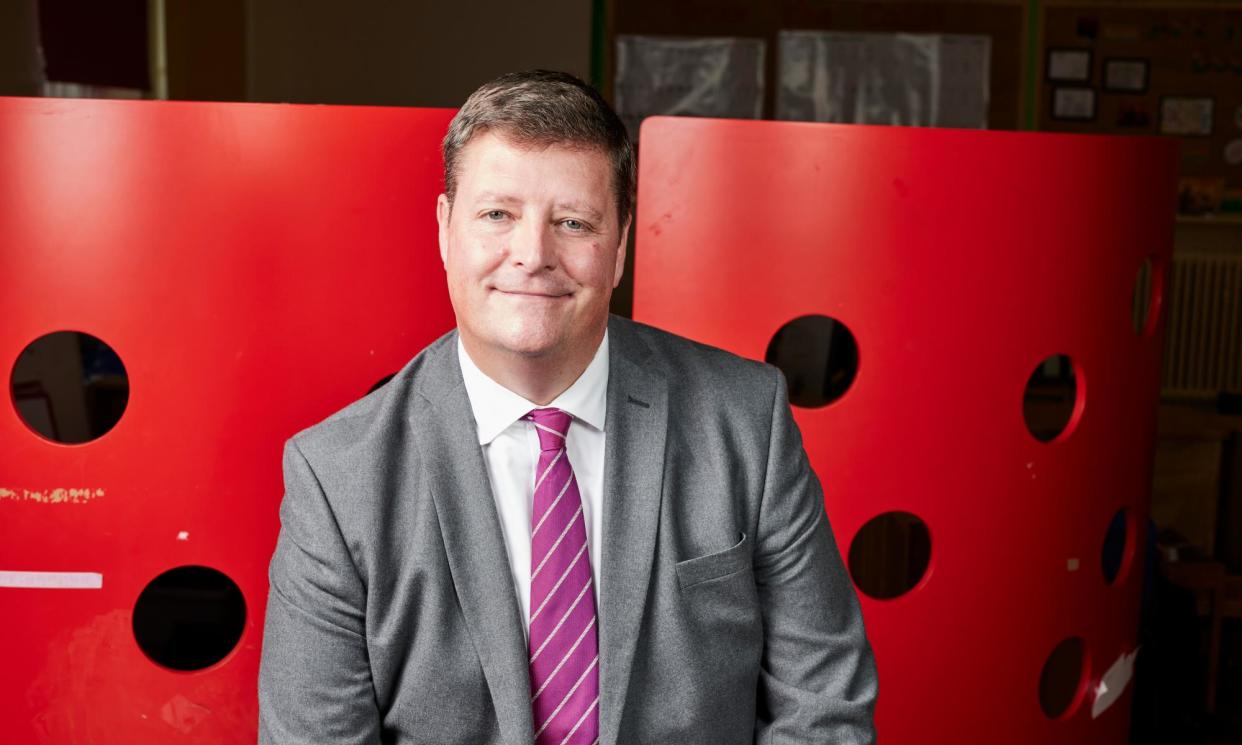‘Teaching is deeply personal’: Ofsted’s new chief on inspections and schools’ struggles

Turning around some of the toughest schools in England is the ideal preparation to become Ofsted’s chief inspector when schools are still struggling after the Covid crisis, according to Sir Martyn Oliver.
With 28 years as a teacher and school leader behind him before being appointed to lead Ofsted, Oliver has spent the past 14 years of that time as headteacher and chief executive with the Outwood Grange academies trust, which runs 41 primary and secondary academies in the Midlands and north of England.
“At Outwood we took on some of the most difficult and damaged schools. Some of them hadn’t been good, not just years but for decades. And the challenges that I’ve experienced in the last 14 years, we’re now seeing those more widespread across the country,” Oliver said.
Related: Record 350,000 parents in England fined over term-time holidays with children
While schools with strong leadership have weathered the disruption, Oliver said more vulnerable schools were battling rising absences and worsening behaviour, as well as catching up on lost learning. “And despite their hard work, those schools are still not managing to return to where they were in 2019,” he said.
Even before Oliver took over as chief executive in 2016, Outwood was known for imposing strict discipline and a surge in pupil suspensions after schools joined the academy chain.
A Guardian investigation found that in 2016-17, Outwood academies had some of the highest suspension rates in England, while former teachers warned of “a culture of bullying and intimidation” among staff within one of its schools.
But Oliver, 52, rejects the idea that he is a strict disciplinarian: “Nothing could be further from what I am. I’ve got high standards for children but the schools themselves are warm and caring institutions.”
Oliver said he had devoted his life to working in schools with high levels of deprivation. Under Oliver, Outwood was often approached by local authorities or the Department for Education to take over schools that had been in special measures or repeatedly graded inadequate.
“When nobody else is stepping up, I always felt a sense of obligation to take on those schools, and that quite often led to having to deal with really extreme behaviours,” Oliver said.
“I’ve walked into schools where behaviours have been so extreme that the staff were on strike. Prior to sponsoring a school, I’ve had children stopping staff in the corridor at break times and telling them that it was no-go to adults. Teachers locking themselves in their classroom at lunchtimes.
“These are the sorts of schools that Outwood, as a really inclusive trust, was walking into.
“Did we get it right every time? I’m certain we didn’t. You can’t take on the most difficult challenges and think you’ve always got it correct, but it was not for want of trying to do right by those families.”
Top of Oliver’s in-tray at Ofsted will be a coroner’s report from the inquest for Ruth Perry, the Reading headteacher whose death following an Ofsted inspection set off urgent calls for reform to the way Ofsted operates.
Oliver said he had personally attended 96 Ofsted inspections at schools he had worked in and understood the high stakes around inspections. He recalled his own tears of relief after every school in his organisation had been graded good or outstanding.
Related: The Ruth Perry tragedy must mark the end of Ofsted’s reign of fear | Polly Toynbee
“Teaching and leading schools is a vocation. What that means is it’s deeply personal. You give your absolute all into running these institutions, and so if you find yourself under the pressure of being inspected, then those emotions are heightened.
“Of all the inspections that I’ve seen, of the 96, the vast majority have been conducted with professionalism, courtesy, respect and empathy. But if there’s one inspection that doesn’t meet that threshold, it’s one too many for the person who’s on the receiving end.”
Oliver says he cannot remember much about some of his own time at school, because of medication to treat a persistent childhood illness. Growing up in Lincolnshire, a county that retains a grammar school system, he attended a secondary modern and then became the first in his family to go on to higher education, at the University of Wolverhampton.
“I can say I’m a proud northerner. Although I grew up in Lincolnshire I’ve spent almost all of my life teaching in Yorkshire and in the north-east. And I’m really proud of the fact that Ofsted will now be based in York. I think that shows a sense of commitment that we have to understand what it’s like in these areas. And I hope that might be one of the reasons why I was successfully appointed to the job,” Oliver said.


